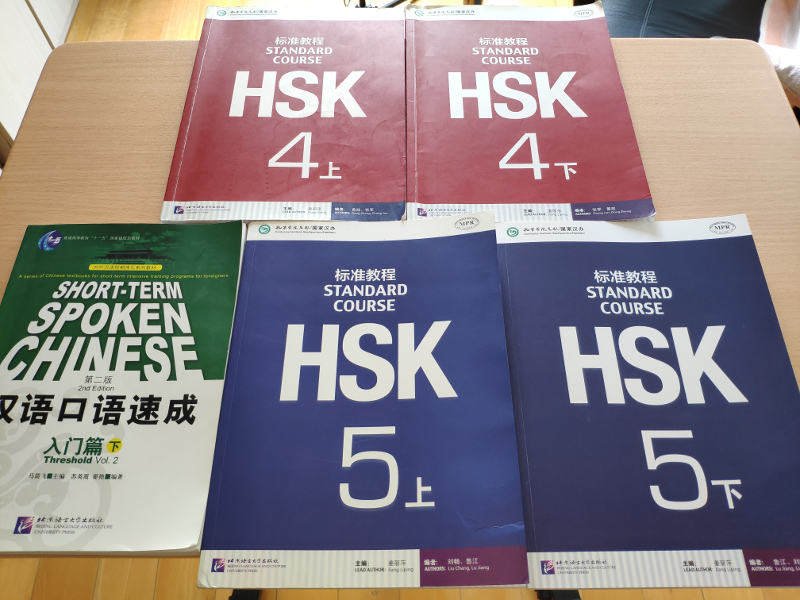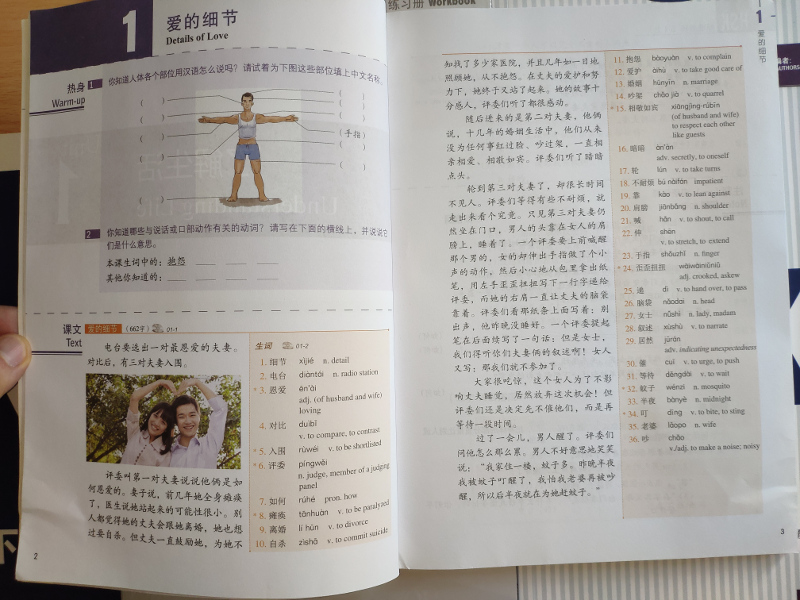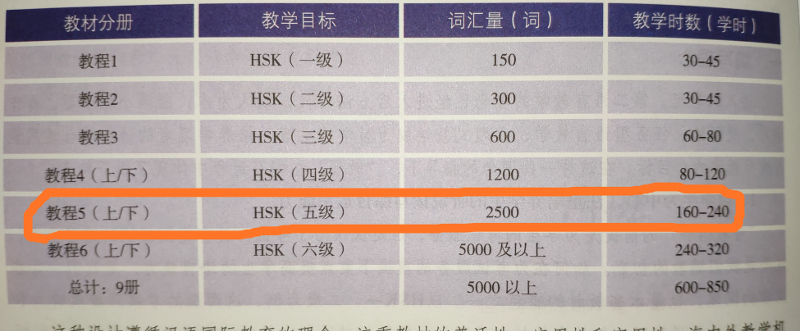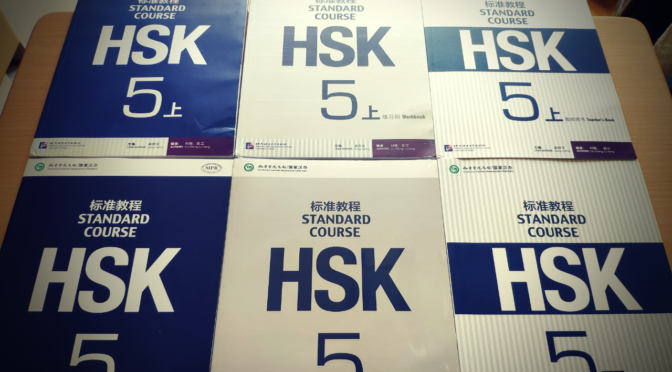As we enter into the second half of 2020 and a restart of work, I thought it would be a good time to step things up a little. And it’s with that that I finally ordered the HSK 5 books.
The new target level is 2500 words TOTAL, which means I now have to learn 1300 words on top of the 1200 I supposedly know from the HSK 4 books.
Does that mean I finished the HSK 4 books?
I’ve gone through them but I haven’t taken the test. You’ll recall that I was struggling to get through the writing sections before, often seeing my marks plummet in those sections of the test. Since then, I’ve spent a lot of time reading a lot more in Chinese (newspapers and magazines) while studying with two different Chinese teachers.
Why two teachers?
I have two sets of books I’m going through now for different purposes. The first set, the Short-Term Spoken Chinese textbooks, are meant for foreigners who want to learn how to speak rather than anything else. The second set, the standard course for the HSK test, focus more on reading, writing and listening and are much more academic in nature.

So what’s the game plan now?
Apparently I’m rather optimistic in thinking I can get through the HSK 5 textbooks by the end of the year which would be in four months. The others I’ve talked to have said it generally took them a year to get through the books and that they were reviewing vocabulary every day. However, since I already review vocabulary every day in addition to read “natural” or “native” resources, I figure I can take a bit of a short cut. I don’t mean skip the work since I know I have to put in the time. But does passing the HSK 5 require only textbook work or can it be replaced by using other sources? This is something I’ll figure out as I make my way through the HSK books.
What do the new books cover?
There are two books, 上 shang and 下 xia, or first part and second part, within which are 15-16 units comprising of 3 chapters each for a total of about 45 lessons in total. Each lesson has anywhere from 30-45 new words. There is no pinyin and the only English available are the translations of the new words.

The surprising thing is that the word list is basically the same length as the text itself. Oh, and gone are the conversations. All of the test are prose only, which is fine by me because that’s what a lot of Chinese is made up of.
All that being considered, how will I approach my studies?
The book suggests that students will need about 120-240 hours of classroom study in order to acquire the skills required to pass the test. This, of course, will depend on each student. It goes without saying that the more time you put in, the better results you will see. The point is that, if I want to get through the course work by the end of the year (to say nothing of the mastery of the key points), then I’ll need to spend 2 hours a day from September until the end of December. This isn’t impossible, as I was spending roughly an hour a day while going through the HSK 4 books.

But, this is where I’m looking to change up my Chinese studies. Instead of writing out the characters a bunch of times (as I did for HSK 3 and 4), I’m thinking it might be better to start composing sentences with each of the new words. These don’t have to be overly complicated sentences but I think it would be better to learn the words in context rather than simply practicing the order of strokes for the characters themselves.
Further, to aid in this progress, it is my hope to do more “active listening”, that is, listening to the textbook materials and then writing out what I hear. Dictations, in another word. If I load the mp3 files onto my phone and then listen to them a few times each and then try to write down what I hear, this, I think, will help in both learning the new words and identifying the sound/tone-to-character image in my head. That’s the hope, anyway. Whether or not my mind will be able to handle this is another question. I also suspect it’s quite hard. I also suspect that any of my former students who read this and had to endure my own dictations in the classroom will no doubt feel a sense of retribution. But it is a challenge to take up.
I continue to listen to Chinese radio, although I can’t say I am able to understand everything. I can slowly begin to translate if I listen really closely, like, squinting eyes and furrowed eyebrows type of listening, rather than casually walking and passively listening. In order to improve listening skills I understand I need to increase my vocabulary and, more importantly, be able to “see” the words being spoken.
Some people have wondered why I spend my time writing when the test is now done on computer.
To put it simply: I don’t think I’d be comfortable saying that I “know” Chinese if I wasn’t able to write anything. Now, will I be composing essays in Chinese just yet? Probably not. Is that my goal? Well… I wouldn’t mind being able to write a blog post or something similar. Well-structured, of course, correct-ish grammar, and able to be understood by a natural Chinese speaker. In short, yes, I’d like to be able to write so others don’t even notice that it’s a non-Chinese author. And I’d like to be able to do that by hand.
One big change that’s occurred over the last few months is that I am no longer tracking how much time I’m spending on the language. This has been both a positive development and a negative one at the same time. The positive is that I am now able to sit down and read something in the language, look up a few of the words, and have some of them stick. The negative side is that I don’t know how much time I spend per day or week in direct contact with the language. I’m not overly concerned with keeping track as I am more focused on my ability to comprehend whatever it is I’m taking in.
That being said, I know it takes me roughly 15 minutes to read an article in the newspaper and that I usually spend about 30 minutes a day listening to the radio using onlineradiobox.com


I’ve been told that the HSK 5 test is a bit more of a speed test than anything else, in that there is a lot to read in a short period of time and that the test has a much larger written component than that of HSK 4. Knowing that, those are the two areas I’ll focus on in the next few months.
And with that, 开始!
